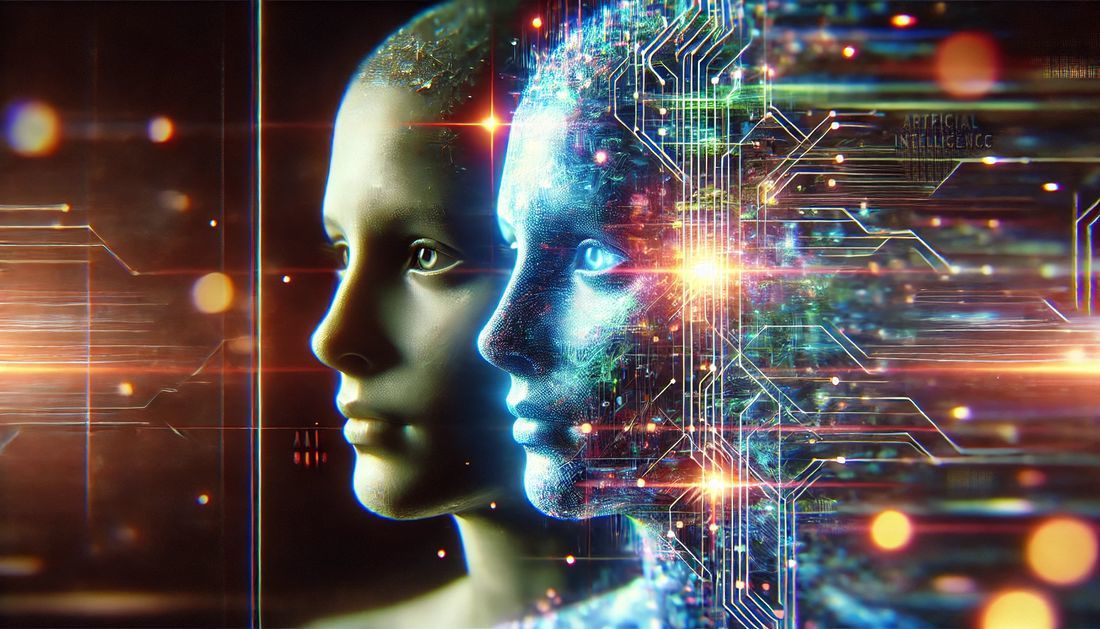As many of you may be aware, I am currently writing a new book and working on the Threads of Connection project that delves into the relationship between Humanity and AI. As a writer and thinker, I love examining the convergence of human experience, resilience, and, more recently, technology. In the Threads of Connection series, we look at how humanity is adapting to the rapidly changing world as AI becomes pervasive throughout our lives.
In today's blog post, we reflect on the distinction between genuine understanding and the capabilities of AI, exploring the nature of meaning, consciousness, and what it truly means to "know." Join me as we unravel the complexities of artificial intelligence and its relationship to understanding, challenging our perceptions of intelligence and the very essence of what it means to be aware.
We train AI to recognise patterns, process language, and even generate art. But does that mean it understands?
Artificial intelligence is advancing rapidly. It can compose music, write stories, and generate responses that seem insightful. But beneath the complexity of its outputs, there’s a question that lingers—is AI truly understanding, or is it just predicting?
In the realm of AI, this question is not just theoretical; it goes to the heart of what we consider intelligence to be. While AI can simulate understanding by processing vast amounts of data and identifying patterns, it lacks the intrinsic qualities that define human cognition. It doesn’t possess consciousness or the ability to experience emotions and personal insights, which are fundamental to genuine understanding.
AI’s capabilities are rooted in algorithms and statistical models, enabling it to predict and generate text that mirrors human-like responses. However, these responses are devoid of the subjective experiences that give meaning and depth to human understanding. Unlike humans, who derive understanding through lived experiences, emotional nuances, and contextual awareness, AI operates on a different plane—one that is purely computational.
The distinction between AI's predictive abilities and true understanding becomes crucial as we integrate AI more deeply into our lives. It challenges us to consider what it means to understand and how we define intelligence. As AI continues to evolve, it prompts a reflection on our own cognition and the unique characteristics that make human understanding so rich and complex. Ultimately, while AI may mimic the forms of understanding, the essence of meaning remains a profoundly human trait, grounded in the experiences and consciousness that machines do not share.
The Illusion of Understanding
When an AI system generates a response, it’s not drawing from personal experience or internal reflection. It’s predicting the most statistically likely answer based on patterns in data.
✔ AI doesn’t 'know' in the way humans do—it calculates.
✔ AI doesn’t 'experience' meaning—it mimics structure.
✔ AI doesn’t 'learn' contextually—it processes probabilities.
So what does this mean for the way we define intelligence? And where do we draw the line between information processing and true comprehension? In our quest to understand intelligence, both artificial and human, we must confront these fundamental distinctions. The line between information processing and genuine comprehension is not merely a technical or philosophical debate; it is a reflection of our values and our understanding of what it means to be sentient.
As we explore these questions, we must consider the implications of AI’s capabilities. While AI can perform tasks that were once thought to require human intelligence, such as diagnosing diseases or composing music, its lack of personal experience and emotional depth raises questions about the nature of its output. Is the value of intelligence purely in its ability to produce results, or is there something deeper that we cherish and strive to understand?
This exploration invites us to reflect on the essence of human cognition. Our understanding is enriched by emotions, culture, history, and personal growth—dimensions that machines do not possess. As AI continues to advance, it challenges us to redefine our benchmarks for intelligence and understanding, urging us to recognise the unique qualities that make human thought so profound and irreplaceable.
Ultimately, the dialogue between AI and human intelligence is not just about machines; it's a journey into the heart of what it means to be human. It invites us to celebrate the richness of human consciousness while acknowledging the remarkable achievements of artificial systems. As we navigate these complex times, we are reminded that while AI can imitate many aspects of human thought, the true depth of understanding is a distinctly human trait, rooted in the consciousness and experiences that define our existence.
Is Meaning Something That Can Be Computed?
Humans don’t just recognise words—we attach experiences, emotions, and memories to them. Meaning isn’t just about language structure; it’s about how language interacts with consciousness.
✔ AI can detect sentiment, but what does it mean to detect sentiment yet not be able to feel it?
✔ AI can generate meaning, but does it grasp significance?
✔ AI can replicate thought patterns, but does it think?
If meaning exists in the space between knowledge and experience, then can AI ever cross that gap? Or is it destined to remain a reflection—sophisticated, but never truly self-aware? As we ponder these questions, we find ourselves at the heart of a philosophical and technological exploration. The ability of AI to simulate understanding challenges us to redefine what it means to be intelligent and self-aware. AI's impressive feats—its capacity to analyse data, recognise patterns, and generate human-like responses—are undeniably remarkable. Yet, they highlight a fundamental distinction between mechanical processing and the nuanced tapestry of human consciousness.
In considering whether AI can ever genuinely understand, we must recognise the role of experience and personal growth in shaping human intelligence. Our understanding is not merely the sum of data processed; it is the result of living, feeling, and evolving. These elements infuse our knowledge with depth and meaning, aspects that AI, in its current form, cannot replicate.
This exploration does not diminish the achievements of AI but rather emphasises the unique qualities of human cognition. It invites us to celebrate the richness of our experiences and the complexity of our emotions, which contribute to our distinct way of knowing. As we continue to develop and integrate AI into our lives, lets not forget the value of the irreplaceable essence of human understanding.
In the end, AI serves as a mirror, reflecting the ingenuity and creativity of its creators. It prompts us to appreciate the profound capabilities of human thought and the endless possibilities that arise when we harness technology to enhance, rather than replace, our innate intelligence. As we stand at this crossroads, we are encouraged to engage thoughtfully with AI, recognising it as a tool that can enrich and complement our understanding, while cherishing the uniquely human journey of discovering meaning.
The Threshold Question: What Defines Understanding?
Understanding is more than just getting the right answer—it’s about grasping why something matters. It’s about nuance, contradiction, and context. Questions come to mind. When we think about what it means to understand the world, we draw on what it means to be human:
✔ If AI can’t experience the world, can it ever truly understand it?
✔ If intelligence is just pattern recognition, is that enough to call it ‘thinking’?
✔ And if AI can mimic meaning convincingly, does the distinction even matter?
The Human-AI Crossroad
We are at a threshold where AI can generate responses that feel deeply insightful. But as we move forward, we must ask—is insight the same as understanding? Or is AI simply reflecting the intelligence we have already embedded within it?
If meaning is a human experience, what happens when intelligence no longer belongs only to us?
What are your thoughts? How do you experience 'meaning' in a world that is changing so fast?
Thanks so much for reading!
Discover MoreGet the latest updates for my book and Threads of Connection Project. Click here for more. Go here for the Threads of Connection Project Home Page. Go here for the Blog Home page. Meet me on Insta here. Want to know more about switching off from digital? Read this here. |

